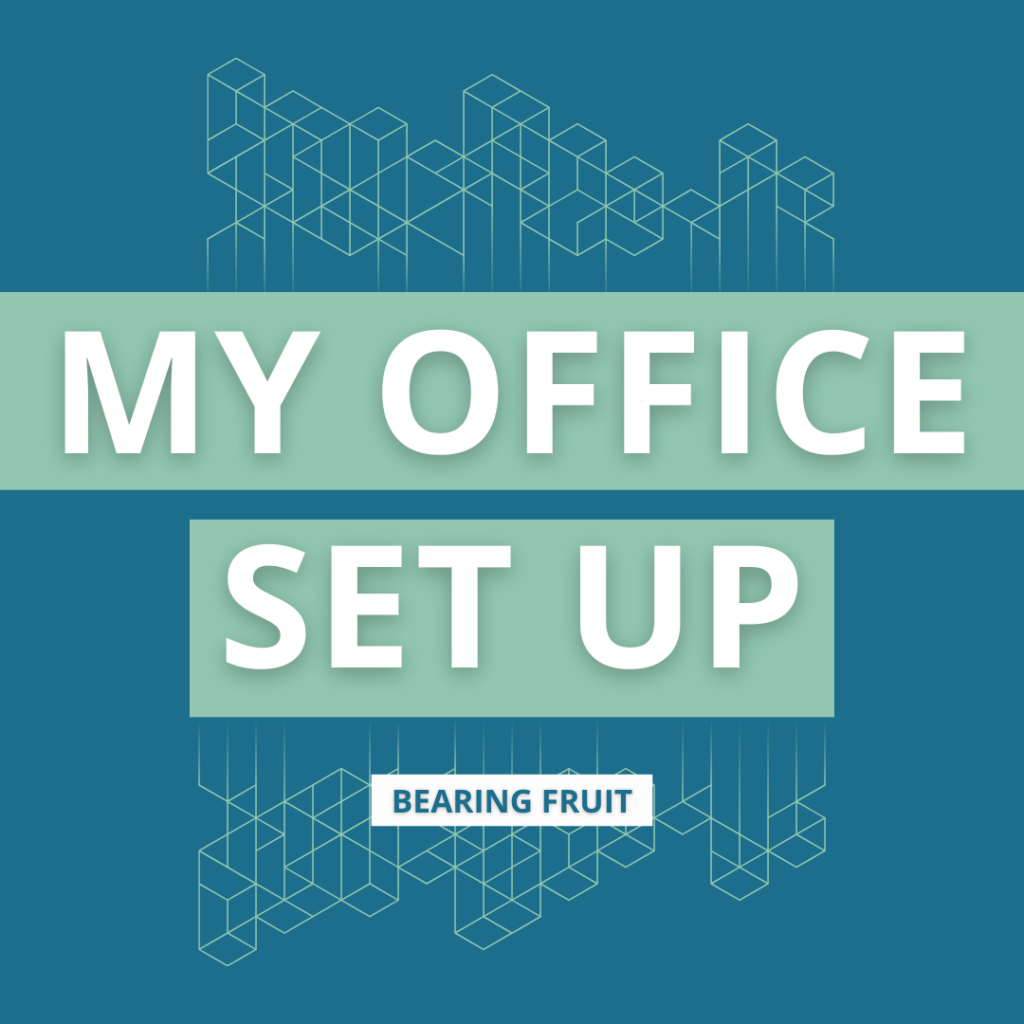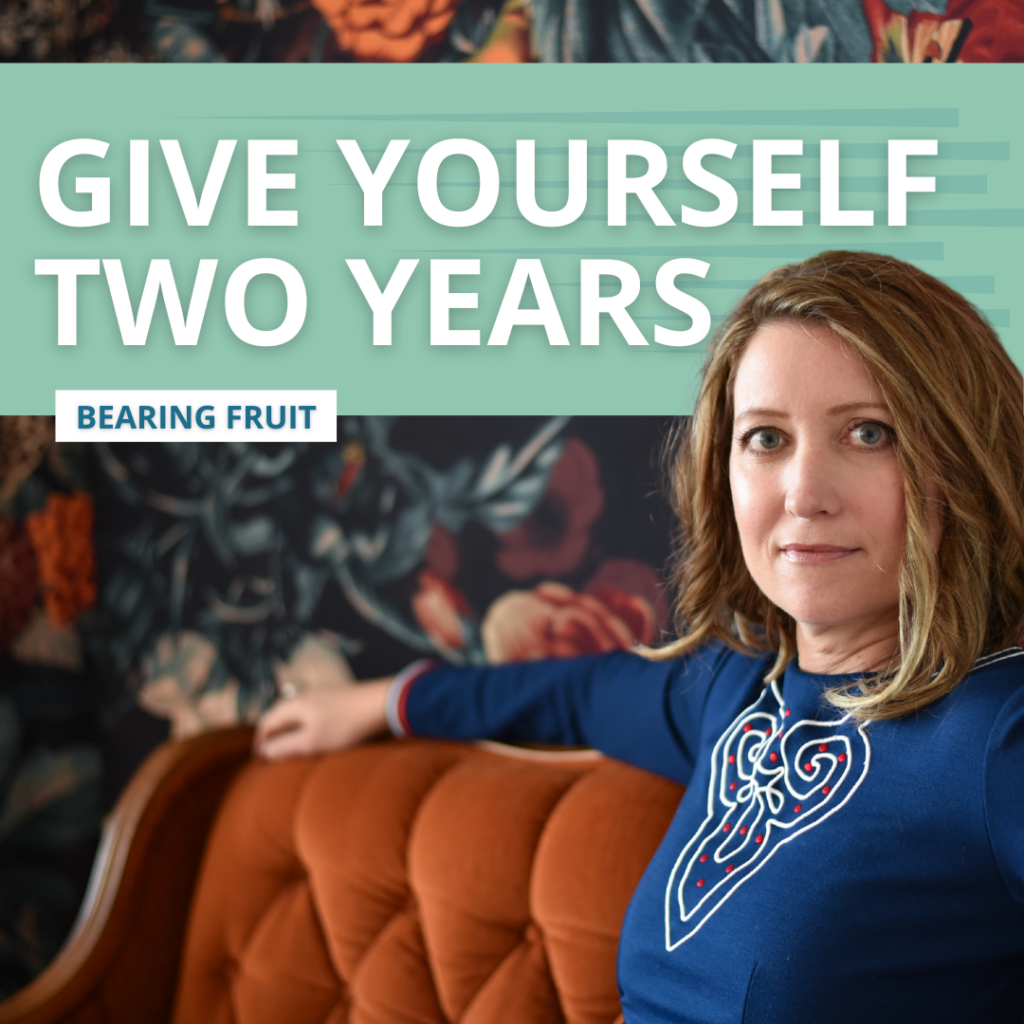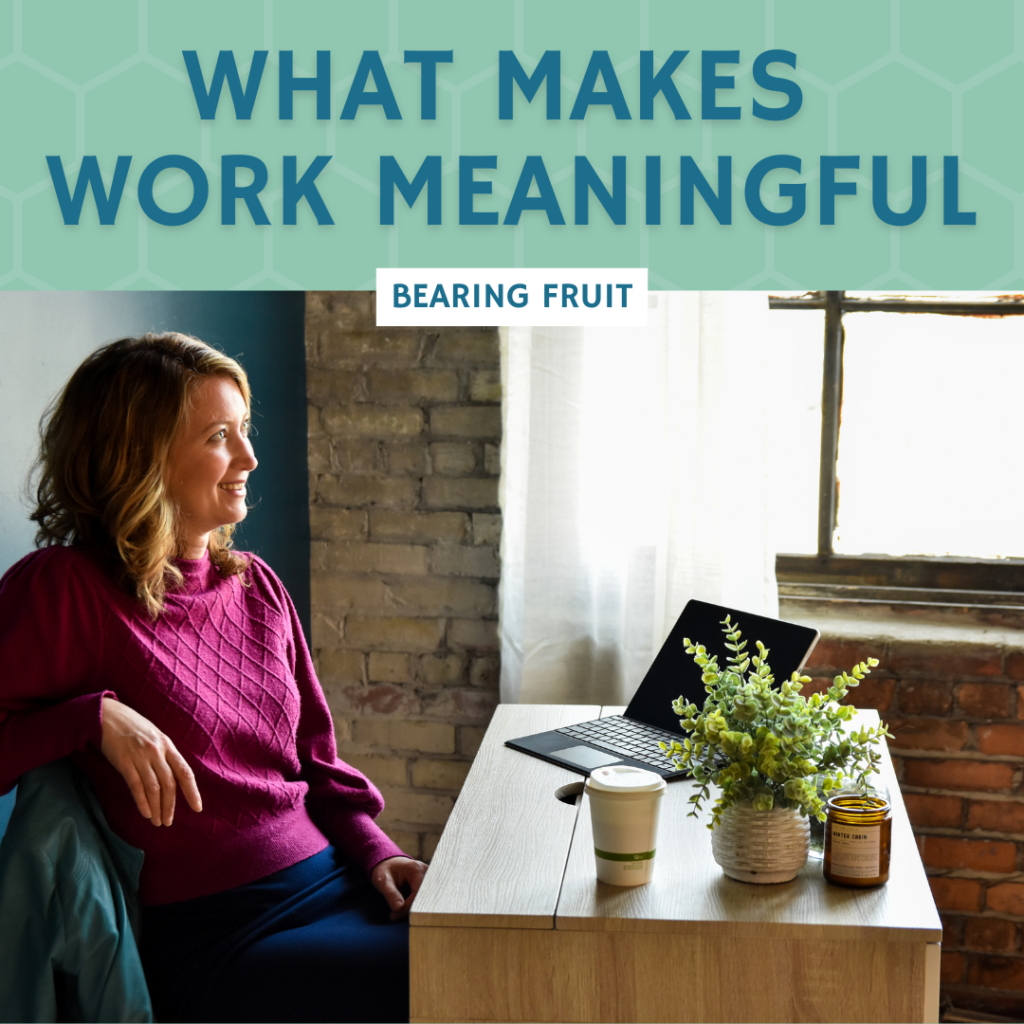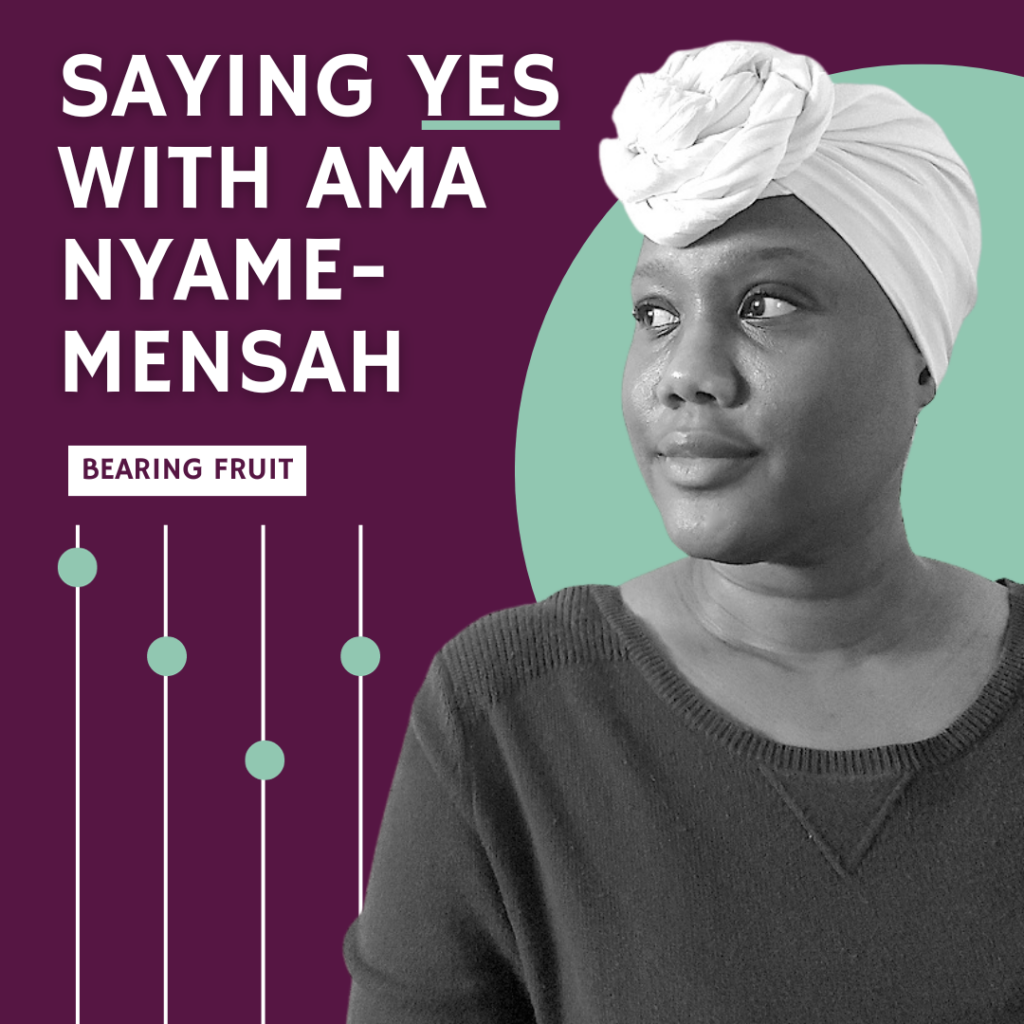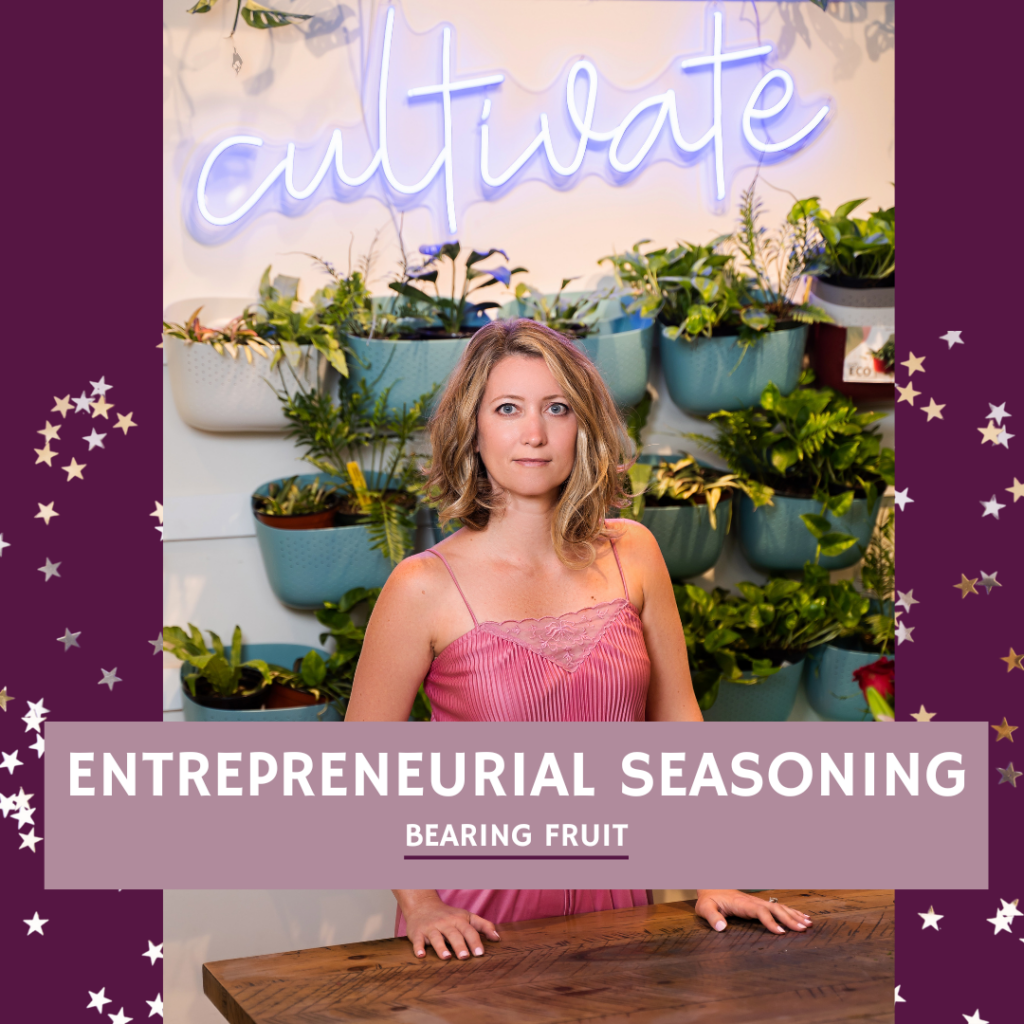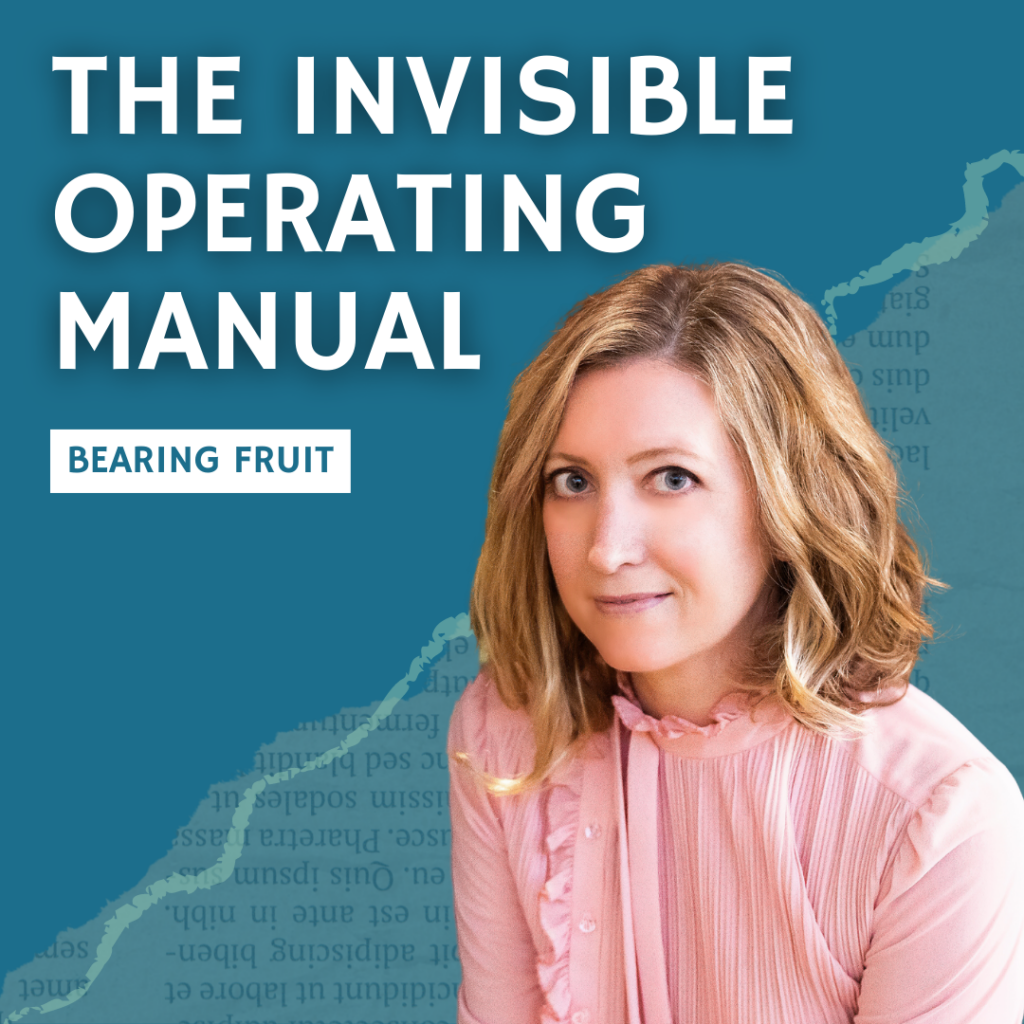Getting Out of Your Own Way
Downtown Kalamazoo got a new tenant:

What do you think is the name of this new business?
I had to look it up on Google Maps. It’s “Anchor’s Aweigh.”
But that logo is gonna drive their customers aweigh, amirite?
Don’t put so many flourishes in your logo that you render it illegible. People need to know the name of your business. This seems basic.
Yet we all do this.
We get between our clients and our services.
You might LOL at this and internally scream at me “MY PROVERBIAL DOORS ARE WIDE OPEN, WHERE ARE THE CUSTOMERS???”
Take a deep breath and let me rewind to August 31st to explain.
August 31st is my Independence Day – the day I quit my salaried job and started working for myself full-time. Every year I celebrate by opening my DMs to anyone with a question about starting or scaling a business.
Here’s one:

The answer to this question is the answer to about 65% of the questions I get:
Get out of your own way.
The biggest obstacle any entrepreneur at any level will ever experience: Your own damn mindset.
Our fears and worries keep us from taking a step.
We fear all the unknowns that go into starting a business, so we never begin. (When all you need to do is ask somebody who’s done it before and has a plan.)
We fear the trolls on social media so we never post. Even if we’ve never actually been trolled in real life. Even when there are ways to handle it. Even when that’s one of the main ways your clients will find you.
We’re scared that our clients won’t believe we have the artistic skill to develop amazing tattoos, so we totally overcompensate on the logo.
Our imposter syndrome keeps us from going after those big, dream clients – when, for all you know, your boutique shop is exactly what they’ve been needing.
Our mindset is “marketing is slimy” so we never actually inform the world that we have services to solve their problems.
Your customers are looking for you. Help them out.
How is your mindset in your way right now? Tell me about it.
If you find yourself thinking “I can’t do that.” the truth is probably actually “I’m too intimidated to do that because I don’t know how to do it well.”
And Babe I’ve got some good news: You aren’t the vanguard.
Other people have walked this path before you. It is well-trodden.
Any worry you have has done been worried already.
It’s been solved.
The answers are out there.
You just need to hook in to the people ahead of you who have plans and some hard-won lessons to share. You need a posse who will hold your hand while you take the next step.
Hang out with me, I’ve got you.
A Cup of Tea
About 5 or 6 years into my career, I got a DM on Twitter from a guy, in which he told me he didn’t like me (of course it was on Twitter).
Curious, I ask what I did to offend him (quick side note: it’s fine to just block and delete these dudes, you don’t have to indulge them in any way).
He said he was insulted by some things I wrote.
My response: Well, I’m not gonna be everybody’s cup of tea.
In short, I’m not changing the way I go about things to please this dude.
The sooner you get comfortable with the fact that you aren’t gonna be everybody’s cup of tea, the freer, more creative, and more authentic you’ll be.
New ideas thrill some people (this is your audience!) and terrify others. So if you aren’t terrifying some people, you aren’t generating any new ideas.
When I first started talking about data visualization, many from the Old Guard got ruffled feathers. Because they had been writing 200-page picture-less reports for decades and here comes some new kid on the block suggesting that they change.
What am I gonna do – stop sharing my new ideas to keep them comfortable?
Of course not.
But women in particular are raised to be such people-pleasers that we often do silence ourselves for the comfort of those around us.
We desperately want to be liked.
Which means when someone gets mad at us, we’re devastated.
So we stay small. We say things that are so neutral and vanilla that no one could ever possibly be offended.
We never have anything fresh to say. We just keep repeating the socially sanctioned tried-and-true bullshit you hear everywhere. Never stand out. Don’t attract clients because we’re indistinguishable from competitors. And never make our mark on the world.
If those same tried-and-true ideas actually worked, we wouldn’t be socially crumbling under late state capitalism.
We need your ideas.
The world is waiting for your innovation.
These days I get a pearl-clutching email or DM every few months. Todd doesn’t like that I talk about the patriarchy or something.
My response: Then stop following me. You should unsubscribe, Todd.
I’m not Todd’s cup of tea and Todd is not my primary audience. Whew, thank goodness I figured that out! It helps me refine who I AM talking to, every single time.
You absolutely have to take the risk of not being liked by everyone in order to have your ideas improve the world for those who resonate with you.
Friday is for Building your Empire
When I worked for someone else, I’d naturally have thoughts about getting the heck out of there Monday through Thursday. But I’d shove those thoughts way deep down out of some guilt that I was plotting my escape on my employer’s dime.
As if my thoughts would show on my face and HR would see it and dock my pay.
But Fridays?
Friday is for empire-building.
That’s why this newsletter is switching from an every-Tuesday schedule to an every-other-Friday rhythm.
By Friday, chances are that you’ve already accomplished whatever objectives you had for the work week. And if you haven’t you’re probably spent. Your brain is done.
You’re already anticipating the weekend.
Not gonna lie, when I was an employee for someone else, you could find me scrolling through shoes that won’t fit my feet on a Friday afternoon.
Until I started using that time to plan out my empire.
Since HR can’t actually police your thoughts, this is your opportunity to think through one business decision.
What will you call your empire?
Do you want to launch an online product?
Way smarter to think through these ideas before you actually quit your day job. There’s a ton of groundwork to lay – do it now. My Friday newsletters will keep feeding you new prompts.
And take one action. Maybe on your lunch break.
Draft up a blog post. (I’m literally typing this on a Friday.)
Mess around with logo ideas in Canva.
Find an accountant.
One idea. One action. Every Friday.
Now that my Evergreen Empire is well-established, I still use my Fridays for thinking my big thoughts, developing my business infrastructure, and taking the behind-the-scenes actions that keep the empire growing.
I’ll often do this from a kayak, on a bike ride, or in my garden.
This Friday – today – I’m gonna read your emails. So write me back with your one idea and one action.
To What End?
The best guidance my therapist ever gave me was through posing this question: To what end?
I musta been on a typical complaint about being stressed from work. Work I love. Work I made, since I started my own company. But still. So much of it.
She asked: To what end? Why are you working so much?
Me: So that I can save the world and help people and make a bunch of money along the way.
Her: To what end?
See, the world will never be “saved.” At least not by me. Not in this lifetime.
The number of people I could potentially help is well beyond my capacity, even if I grew a staff of 10,000. I’ll never be able to help them all.
And the money? You know it’ll only take you so far.
So… what’s the end game?
Up until that point, my loosely-defined goal was “as much as possible.” Let’s aim for infinity and make the journey fun.
Except that’s not reality. When you’re doing this:
It doesn’t matter if the chocolates are worlds to save, lives to improve, or dollars in your bank account, you get sick. It’s gross.
This is how you burnout.
“To what end?” forced me to think about a better defined business goal. Because your goal ultimately shapes your day-to-day.
Thoughtful small businesses usually have one of three major end goals:
Sell.
In this model, you’ll ultimately plan to sell your company and its intellectual property to someone else. If you’re running for this goal, you’ll likely focus on creating processes you can patent, you’ll trademark things, you’ll strive to product-ize your work.
The more systems you create, the faster someone else can step in and pick up right where you left off. And the easier it will be to get a valuation and enter into buy out talks.
Your day-to-day includes innovating new things and making them replicable and marketable. You might have staff implementing your established processes, but it’s also likely that you have a lot of folks in research and development, testing new patentable ideas.
Think of any tech start up on the West Coast and you’ve probably got a company with a Sell goal.
Though my financial planner has been pressing me to think of selling upon retirement, I’ve never considered that to be my goal for Evergreen Data.
Legacy.
Entrepreneurs focused on making a legacy will spend more of their time building a reputation.
That could look like heavy engagement in thought leadership or book writing. Sure, some thing might get trademarked in the process but that thing is inherently tied to its inventor.
Or it could be more like focusing on an extremely high quality deliverable that makes you incredibly attractive and memorable.
For example, I’m thinking of a dear elder in my family who started an architectural and engineering firm that he named after himself – Byce and Associates. He trained an expert staff and eventually sold the company (Sell!) but the new owners kept the same name because the legacy and reputation were so strong.
Think about your field – those big names are probably in this Legacy category.
Lifestyle.
People running Lifestyle businesses aim to work enough to support their desired lifestyle and no more. Your workload is naturally capped by your personal ambitions.
Lifestyle entrepreneurs tend to see more balance in their day-to-day. They don’t as often work a whole weekend writing another journal article – they’re more likely to be planning their next vacation or working in their garden.
They’re still running a business of course so they’ll still have some thought leadership and some staff perhaps but scaling to a team of dozens isn’t important. They don’t feel a need to leave their mark on their industry. They want to do important work and then go to Greece.
The accountant who earns all the income he needs in the first four months of the year and then closes shop to live his life for the other 8 – that’s a Lifestyle business.
So, to what end?
These are the three primary end goals I see. Each one naturally manifests in a very different daily practice. When my therapist asked me “to what end?” I didn’t know how to answer her and that’s likely because I was trying to do all of these at the same time. It was exhausting me.
These end goals aren’t mutually exclusive, they’re more like the three corners of a triangle. You can be anywhere in between. I personally go back-and-forth between them in different seasons of my life.
Where do you think you are right now?
My Office Set Up
While money can’t buy happiness, it does help. For example, my new office desk and chair are making me actually want to spend time at work.
I was due for a change. My old office chair was a thrift store find my cats had turned into a scratching post. And I was using two separate desks. One stand-up setup that my ex-husband constructed. Loved it, but it barely fit all the equipment I needed for an online workshop these days. And the other desk was a sit-down in the classically old wood style that had a dozen drawers and weighed 200 pounds.
This is my new desk:

It replaces both of my old desks because it’s motorized and raises and lowers itself. In fact, I can preset 3 different heights for when I want to sit, stand, or use a stool.
This variety keeps me from getting bored. Or sore.
Also, see the undershelf lighting? It comes in a bunch of different colors! Need a perk up? Switch it to yellow.
I also ditched the cat bed for an armless chair with a wide seat:
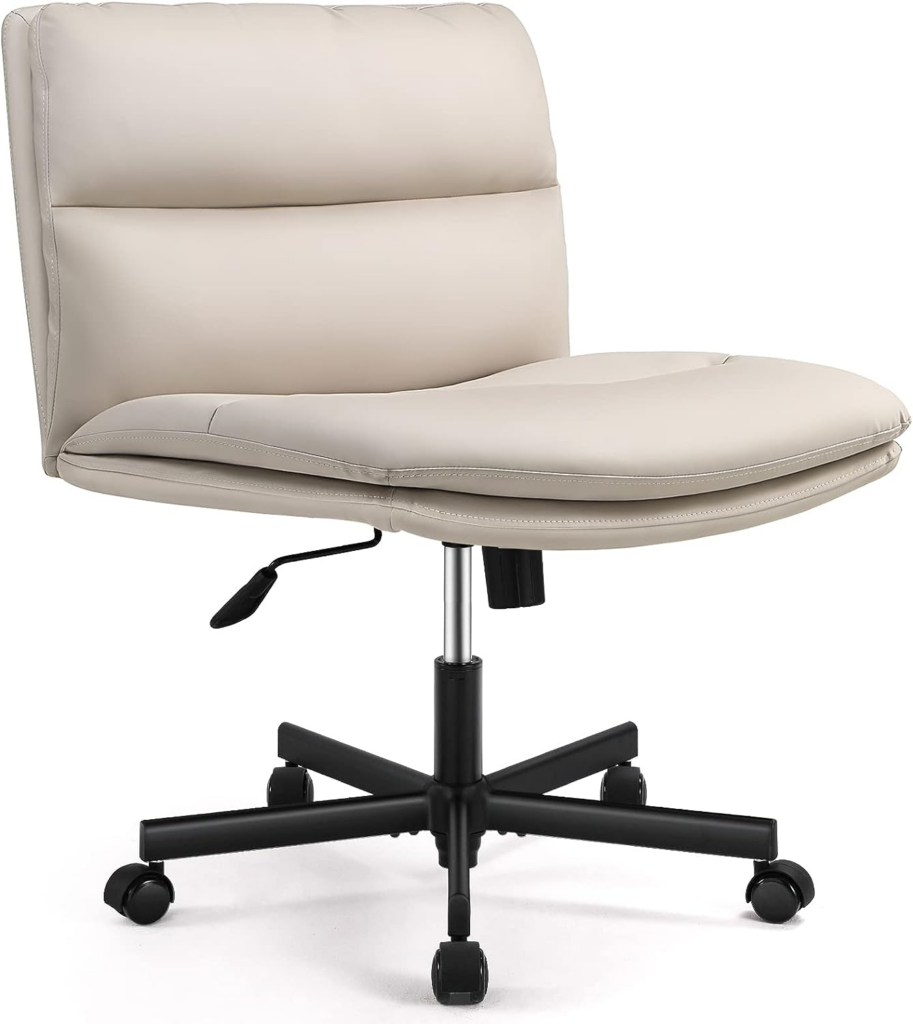
This design means I can sit with one leg tucked up under me or even fully criss-cross applesauce or a dozen other configurations that keep me actually at my desk working.
Between the desk heights, light colors, and sitting options, the combinations my physical body in better shape and make it so every hour of my work day feels fresh – and fresh keeps me inspired.
Together these may look bland but drop them onto my lime green shag rug, set against my bright yellow walls and honestly being in my office makes me so happy.
Want to take a look around?
This is the view from my fresh chair – which now sits, with the desk, in the middle of the room.
You’ll notice:
☀️ Natural light
🪴 Plants
💻 Space for all the online workshop tech
🟨 Those yellow walls
🎨 The back half is my art studio
Huberman Lab has an entire episode dedicated to the research behind optimal office setups for focus and health. Art studios aren’t in their recommended list. Plants are. Listen here.
What you can’t fully see in this video:
The stairway leading up to my office is plastered with thank you notes, postcards, and memorabilia from my work travels.
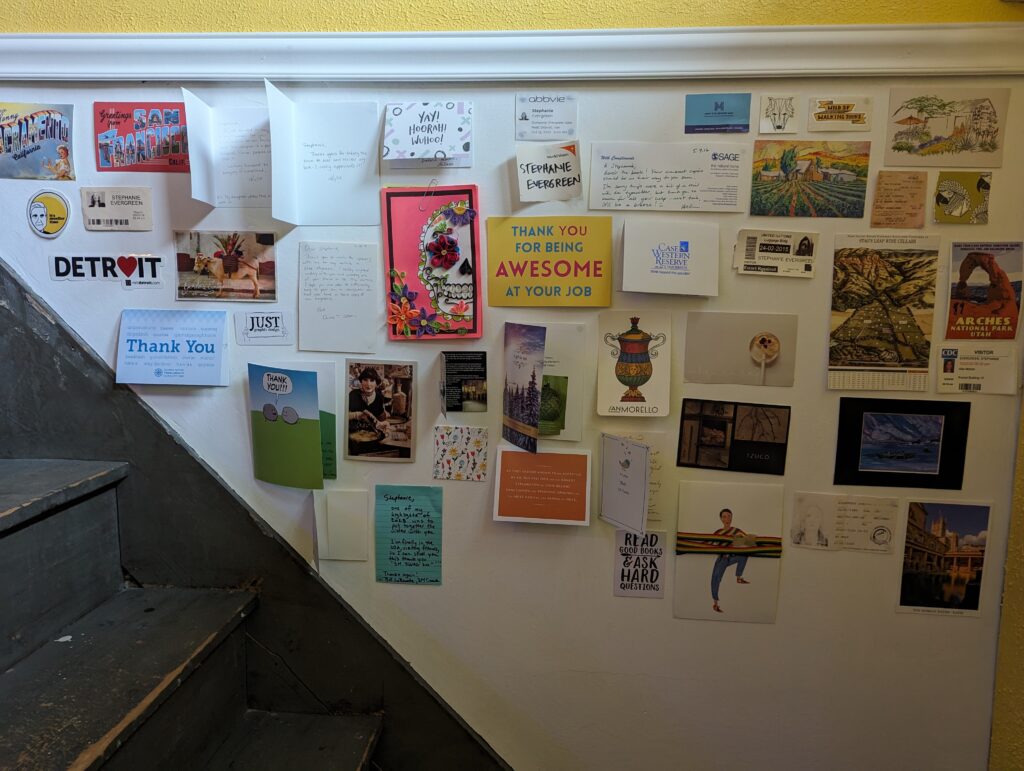
Coming or going, I’m reminded of all the amazing places and kind hearts I’ve worked with over the years and I feel profoundly grateful for my global community and that all gets me through the smaller, much more tedious moments of being an entrepreneur.
So, I spent several hundred dollars this year on new office furniture (during Prime Days on Amazon so I spent less but still, it’s Amazon, I know, don’t judge me). It drastically changed the vibe in my office, like opening the windows to let in fresh Spring air.
Even if your budget can’t manage that much, what small thing could you add that would make your heart smile? A candle? A photo?
I would love to see your favorite thing about your office. Send me a pic.
Give Yourself Two Years
To be totally transparent, I’ve thought about closing down the weekly Bearing Fruit newsletter more than once. It takes a lot of *all I’ve got* to write to you this often, especially with some kind of clarity or insight.
And I knew that if the newsletter shuts down, so goes Boost & Bloom, my course for founders.
“It’s fine,” I thought. “This isn’t a big money maker for me. I just love nurturing other people’s businesses. But I’ll get a bunch of my time back and that’s healthy.”
I announced my wavering to my students. One of them immediately wrote back with:
“I just got actual money, in my LLC account 25 minutes before I read this email.”
(It’s these victories that make my heart sing.)
She said, “You cannot scale back on this course. You are two years of snowflakes on their way to an avalanche.”
It takes two years.
She’s right. Building something as complex as a new business (mine included!) takes about two years.
I see this in my taekwondo journey and you can probably map out something similar in your own life.
I recently passed my blue belt test.

At my dojo, that’s halfway to a black belt. If you’re consistent with your practice – meaning you come to class twice a week, practice a bit at home, and dial in your nutrition, sleep, and stress – you can be a black belt in two years.
It took me two years of homeownership to fully realize allllllll the labor it requires.
The first year I planted my garden, it was sparse – just a few flowers. The second year? Total smokeshow.
If I was watching taekwondo YouTube videos once a month, it would take me much, much longer, if not forever to gain the skills of a black belt.
In other words, two years seems to be the shortest time to evolve something new.
The shortcut comes when you have:
A coach, who can give you personal and specific feedback
A plan, showing you what to handle when
Consistency, where you show up on a regular basis week after week
Patience, so you don’t beat yourself up for taking the time it just takes
You need that amount of space to see the seasons.
The ups and downs. To get enough experience that you make mistakes you can learn from. To let word of mouth work its magic. To get comfortable with the discomfort.
It takes two years because there’s so much to build – and you also need to keep your head on your body and your soul intact. Keep breathing.
Though I have nothing but experience to back this up, I think two years is also the time to evaluate if your efforts are paying off.
Let’s say you’ve decided to launch a video series on LinkedIn. You’ve consistently produced weekly, informative videos about your specialty, as a form of content marketing to turn some viewers into clients. If you’ve been working at this for two years and you’ve gotten maybe one client and your videos are only garnering a dozen likes, it’s time to cut your losses and focus your content marketing elsewhere.
If you started a newsletter two years ago but only published twice and you’ve got just your parents on your email list, it’s time to re-evaluate. Perhaps you shut it down. Perhaps you need a coach, a plan, consistency, and patience.
If you’ve been building your business behind the scenes for two solid years before you get your first deposit into your LLC account, you should celebrate. Your hard work is working. That timing sounds about right.
I promised to protect names where requested, so this student will stay anonymous, but check out this result, almost two years after enrolling in Boost & Bloom:
“I’m not exaggerating when I say that the $2,000 class has already led to a 37% increase in my monthly profits. And I only work about 25-27 billable hours a week due to my work/life balance goals.”
(There goes my heart singing again.)
Vinu knew:
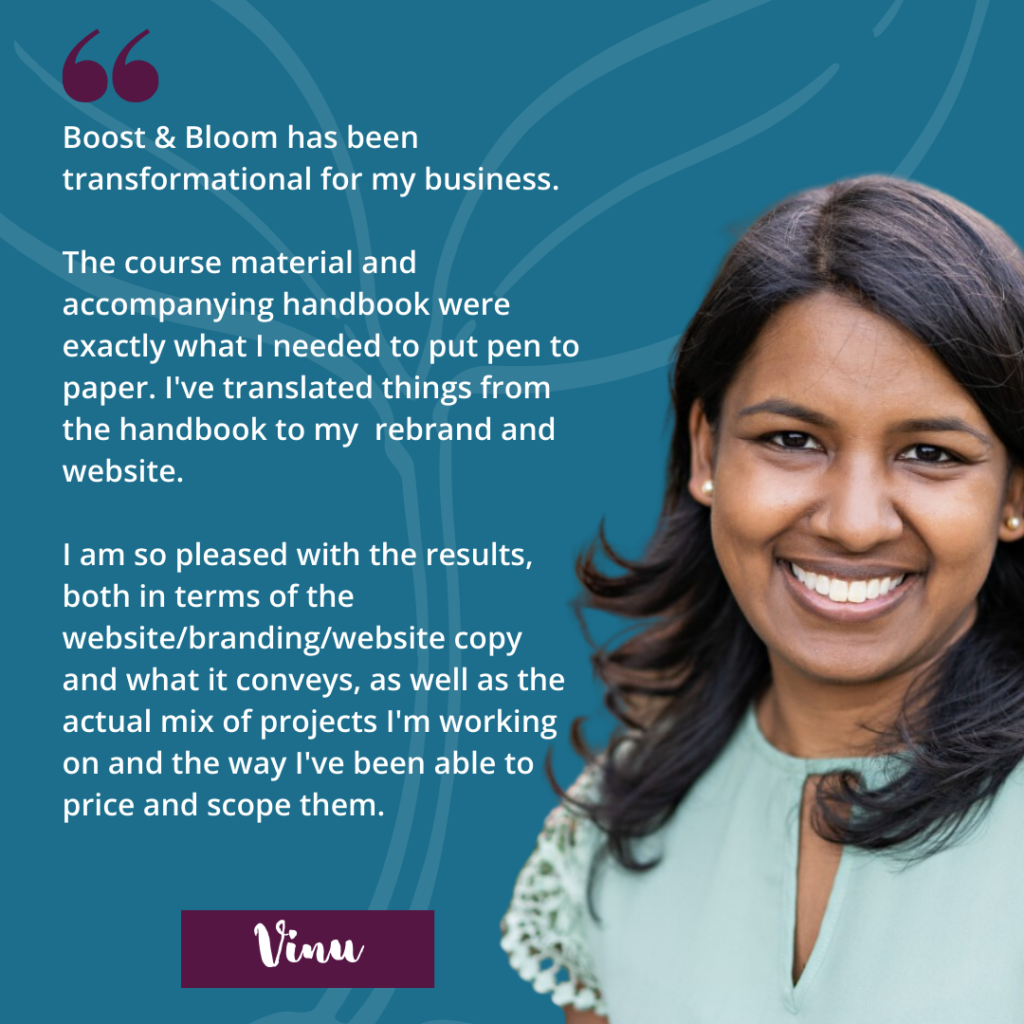
You can feel around in the dark and take forever but you’ll go further faster with a coach, a plan, consistency, and patience.
Folks with businesses already established will see results even sooner. This is what happened to Mara, after only 10 months in my course:
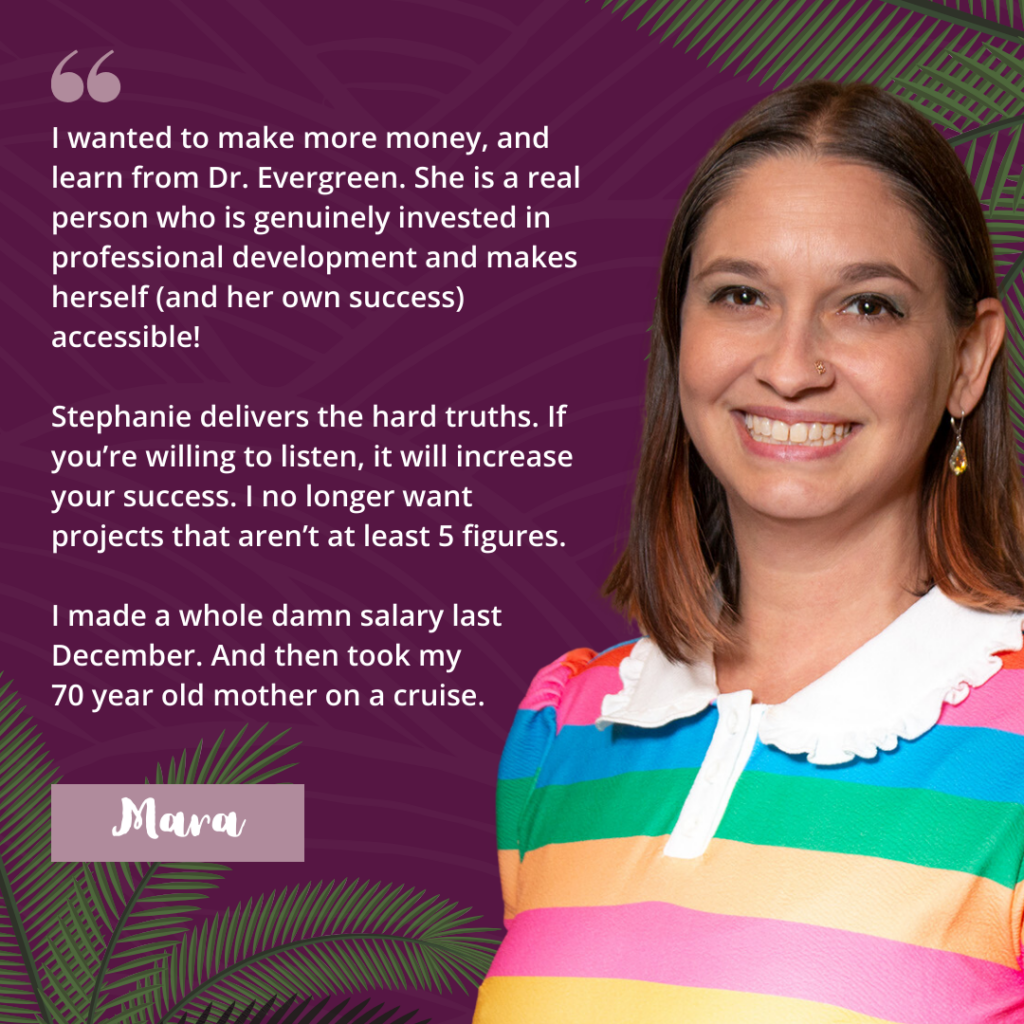
Took her mom on a cruise! Damn, that’s cute.
Join us in Boost & Bloom and give yourself two years to grow. Enrollment closes tomorrow.
I’ll bring the coaching and the plans. You bring the patience and consistency. We’ve got this.
I Have an Arch Nemesis
Actually, I have a few.
Despite my therapist’s suggestions to let it go because “the only one getting hurt by resentment is me” 🤮 I keep my grudges in a box covered in sequins tucked in the back of my closet. Not in sight every day but easy to find when I need it.
Each of my nemeses used to be a work buddy who took advantage of our friendship and information I had divulged to become a competitor in our industry. They did me dirty.
Competition comes up in almost every one of my entrepreneurial circles. Mario, one of the funniest and kindest aspiring entrepreneurs I’ve met, has an industry arch nemesis who – get this – is also crushingly handsome. 😍🤬😍🤬
What do you do with an arch nemesis?
How do you handle competition?
Step 1: Watch them carefully.
You’re looking for their gaps. As much as your imagination may have puffed them up to be perfect, that’s impossible. They surely have topics they don’t cover or an angle you disagree with. That’s where you can lean in with your approach – the things that make you different. The more you can distinguish yourself, the less they’ll feel like competition.
If you can’t find something you disagree with, that’s also a clue. It means they’re so plain vanilla they don’t make waves. It’s inauthentic. You just have to be you to be better than that.
Step 2: Stop watching them.
Block and mute. This step takes you 30 seconds at most. It can be a hard psychological mountain to climb because our false people-pleasing characteristics make us think we’re supposed to be friends with everyone.
And that someone is going to see that you’ve blocked them and it’ll become a controversy. You aren’t Britney Spears and Justin Timberlake. No one will notice.
Just like how I don’t buy potato chips at the grocery store because I’ll eat them all – It’s bad for me. Block and mute keeps your competition from taking up rent-free space in your head.
Put them in a tiny sequined box that you tuck away in the back of your closet. Out of sight, out of mind.
With the headspace you get back, create. Mind your own business, literally. Focus on your own work and GO.
Step 3: Pull out the tiny sequined box as needed.
I root into the back of my closet from time to time when:
– I’ve run out of ideas for my blog or social media channels. I can always take a 5 minute spin through what my arch nemeses have been posting lately and find a gap to address (without ever naming them).
– I see a friend about to make the same mistake I did with one of my arch nemeses.
– I need a reminder that I’m a bad bitch. Should imposter syndrome ever start creeping in, I’m able to review their plain vanilla asses and be reminded of what makes me, me.
Look, this isn’t the advice you’ll see in movies that say you can make that Mean Girl your friend (or frenemy). And this definitely isn’t what my therapist would advise. But it’s a way to skim the advantages you can off of the situation while preserving your mental health and your heart as much as possible.
Got an arch nemesis? You wanna tell me who did you dirty? I’m all ears and your secret is safe with me. I’m not yet at a point where I’m ready to name names but I promise that every time you see me mention “Todd” I’m talking about one of mine.
What Makes Work Meaningful
I learned a new word: Eudiamonia. It means “flourishing and living a life that realises one’s potential.”
I can’t pronounce it, but eudiamonia is all I want.
Work is surely only one component of a flourishing life, but it’s a big one.
Nikolova and Cnossen just published a study that identifies the three big factors that contribute to whether you feel your work is meaningful and satisfactory. The three big factors are:
Autonomy
Which means that you believe you have control over what you do with your time.
Competence
Which means you believe you can figure it out, even if it’s challenging, and that your effort contributes to a greater good.
Relatedness
Which means you believe you’re well-connected to your colleagues and bosses.
If you’re high on these three areas, the researchers say, you’ll be willing to withstand some underperformance in other aspects of job satisfaction. For example, the authors report that nurses usually have a high job satisfaction, even if there are parts of the job that totally suck.
I can hardly understand this, but those three factors were “4.6 times more important” than working hours, pay, benefits, and career advancement.
Pay and benefits were not as important.
Record scratch.
Perhaps if you are forced to choose between purpose and pay, you’d choose purpose. But it’s a false dichotomy.
When you work for yourself, you get to set your own pay and choose your own projects. You get pay AND purpose.
And that’s why these particular results excluded people who were self-employed. The researchers said this was because self-employed people can’t score on relatedness, since they have no peers or bosses. Huh? I have a wonderful group of colleagues. (And the best boss, just sayin.)
If they included the self-employed, it would certainly skew the results, but not because of relatedness. Because we’d be the examples of eudiamonia – where you can do incredibly meaningful work AND have flexible hours and a strong income.
It seems to me that the only way to really achieve eudiamonia is to work for yourself.
When the researchers pulled a subset of the data, where they could include the self-employed, they found “the self-employed enjoy greater mental health and subjective well-being compared to similar regular employees… This well-being premium is often attributed to the utility of being your own boss and having autonomy and flexibility.”
And, I’ll add, BEING PAID WELL.
Did your mental health change when you started working for yourself?
Mine sure did.
And, to note, the researchers pulled this data from the European Working Conditions Survey – so this sample is a particular cut of society. One where it’s common to go on holiday for the entire month of August and take 2 hour lunches with friends.
How do you think these results would differ for people in the American work culture? Or the Indian work culture? Probably a lot, though I don’t know how. So take this with that particular grain of salt.
The researchers added that “career advancement possibilities and working hours are more strongly associated with meaningfulness for the non-self-employed group.”
Which, I’m speculating, is because we the self-employed advance our own careers and set our own working hours. We don’t rely on the benevolent boss to deem us worthy. We are worthy. All of us.
If you haven’t yet taken that spring off the cliff to work for yourself, let this study be one more reason – it’s the best way to achieve eudiamonia.
If you already work for yourself, let this study light you up on the darkest days of entrepreneurism, when you’re dealing with the parts that totally suck. Your chosen path is the best set up to flourish and make the most of this one wild and precious life.
Ok, I can’t end on such a tender note. I’m going to leave you with the one quote from the article that made me LOL:
“Dur and van Lent (2019) document that about one in ten employees finds their job useless, with the share being the highest among those engaging in routine tasks as well as those in sales, finance, public relations, and marketing.” (Emphasis added is mine, I love you people and wish you a flourishing life.)
Saying Yes with Ama Nyame-Mensah
Ama Nyame-Mensah DMd me with a super juicy comment: I think I have some prospective clients who are breaking the No Assholes rule.
Let me back up: Ama is a student in the first cohort of my Boost & Bloom course for entrepreneurs and she knew that my three rules (passed to me from my mentors, who had it passed to them) are: Fun, Lucrative, No Assholes.
Let me back up further: Ama runs a company named Analytics Made Accessible (handily acronymed AMA – get it?). It’s a few years old now. Ama and AMA help people explore, analyze, and communicate their data more effectively, primarily by teaching folks to create compelling charts and share data stories that matter.
A company after my own heart.
And most of the time, I see young entrepreneurs so stressed about paying the bills that they’re saying yes to everything that even remotely looks like it could contribute to cash flow, even if the prospective client is kind of a jerk.
But not Ama.
Stephanie: Ama, you’ve clearly done the internal work to know your boundaries and to be able to spot a jerk from a mile away. What exactly is on your red flag list?
Ama: I will never forget a piece of advice my sister Akua —an Executive and Leadership Coach—shared with me a couple years ago: “If you say yes to everyone, you’re always saying no to yourself.”
Stephanie: I’m reading that again.
Ama: And she’s right.
When I first launched my business, I said yes to everything and everyone. I didn’t care who I worked with as long as I got my name out there and made money—bad idea. I was saying yes to projects that weren’t a good fit and clients who didn’t respect me.
The result: I was miserable.
Hustle culture tells us that overworking and accepting mistreatment from demanding clients are necessary to achieve success. Working with difficult clients who disrespect you and your boundaries and undervalue your expertise will ruin your business and wreak havoc on your financial and mental health.
Stephanie: Give us an example of client disrespect. I’m hoping others will read this and start to recognize when it’s happening to them.
Ama: I’ll share two flavors of disrespect.
Flavor #1: Not valuing my time.
I once had a prospective client reach out to me, looking for an external evaluator for a project.
I will not lie; I initially disregarded the message and sent it to my junk mail because I thought it was spam. But curiosity got the best of me, and I responded to the email, thanking them for sharing the opportunity and setting up a time to chat about the project.
Readers, I kid you not; over two months, this individual rescheduled on me FOUR DIFFERENT TIMES (including once right as we were supposed to log into our scheduled Zoom meeting)!
And if you’re wondering, we never connected about the project.
Then, three months after not connecting with this person, I got an email “thanking” me for my interest in the consultant position (huh?) and completing and submitting documentation (I never submitted any paperwork) …BUT they had decided to proceed with another party. (I got a good laugh out of that one.)
Looking back, the biggest mistake I made was going back and forth, sending multiple Zoom links to a prospective client who was never interested in working with me.
Life happens, meetings get moved, deadlines get shifted, etc. And I cannot penalize someone simply because they’re late…once (maybe twice). But when someone repeatedly reschedules, postpones, or does not show up before becoming a client, you can guarantee they will do the same once you start working with them.
Bottom line: Don’t work with people who do not respect you or your time.
Flavor #2: Rude and unkind.
A couple of years ago, someone approached me to lead a potential project their team had been kicking around. They were attached to a cool group, so I was excited about collaborating with them. So much so that I let a lot of things slide that I shouldn’t have.
By the time I realized something was very off, I had already done several months of free work with no contract in place. But I thought: No worries; we had talked about them paying me for the work I had done to shape the project upfront after pushing the paperwork through.
Readers, that never happened.
When the paperwork was almost complete, everything fell apart. The organization spontaneously came up with a new deposit policy, which they promptly blamed on legal. And when I reached out to have a conversation with my point of contact, the conversation went horribly, horribly wrong.
What I hoped would be a moment for us to come to an understanding about my boundaries and a reiteration of what we had previously agreed to devolved into a weird conversation where they casually dropped that I should be grateful that they would even consider working with me on a project like this.
Rude much?
Remember, you are a business owner. You do a job, get paid, and the cycle continues. (That’s not to say you cannot forge long-lasting, mutually beneficial relationships with your clients.)
But some folks will make you think they are doing you a favor by working with you, even though it’s work they want (and usually need) done. Clients you partner/work with are not doing you a favor. There is no “favor” in business. People value what they pay for, and they pay for what they value.
Bottom line: Don’t work with unkind people.
And Stephanie’s bottom line: No spec work! No work before the contract!!
Now that I’ve been burned a few times, I know to look for these positive signs that someone (or an organization) will be a good partner:
- Collaborative: At the heart of any successful collaboration are communication and transparency. I am always excited by open-minded clients interested in working together to experiment and discover what works and what does not. Data + Design work is iterative, so partnering with folks open to hearing and giving feedback is key.
- Kindness: To some, respect can be bought. For example, if a client is purchasing your services, you (the consultant/entrepreneur) have to respect them while they can treat you (and their staff!) however they please. When I talk with prospective clients, I watch (and listen!) to how they interact with each other and me. People who treat others with respect and kindness are more likely to treat you with respect and kindness.
- Follow-through: Anyone can talk a good talk. But good prospective clients walk the walk. Verbal commitments are great, but they mean nothing without consistent action. This is where follow-through comes in. Follow-through is the key to creating trust in a new relationship. It lets people know you are serious and that you value their time. Follow-through at the beginning of a client relationship can be as simple as honoring meeting end times or demonstrating a commitment to a project by sharing a project description or proposed budget.
Knowing how you want to run your business, the types of clients you want to partner with, your values, and being comfortable communicating your expectations and boundaries will make you a happier entrepreneur.
What would you add to your Yes List? Tell Ama!
You Don’t Have to Be Passionate
I know this sounds impossible, but hear me out: You don’t have to care about the product you sell.
Honey, I can hear you saying “Why the heck would I quit my secure 9-5 to launch a company if I don’t care about the product? Like, deeply care. Like, maybe even more than I care about my spouse.”
Let me tell you about an entrepreneur I know – we’re gonna call him Kevin.
In college, Kevin needed some cash flow so he literally googled “low-cost small business ideas.” He got loads of results with titles like “25 Easy Small Businesses” and the whole concept seems totally laughable to me but hang on.
He’s scrolling these lists and kinda just randomly picks one. It’s now so famous that I’m gonna make up his product for the purposes of his privacy: cheap earbuds you can gift people who insist on Facetiming in public.
Even though I think speakerphones in public should be a crime, Kevin doesn’t care at all. It’s never even crossed his mind that this is an issue.
But he launches the company anyway, constructing cheap earbuds in his college apartment living room.
They’re wildly popular, so pretty soon he’s shopping for a production facility and a warehouse. He hires management and marketing people who care deeply about how your conversation with your BFF while she’s in Portugal belongs to just you and your bestie.
The company skyrockets.
They produce earbuds in different colors. They enter into branding agreements and generate logo-ed styles. Everything’s coming up Kevin.
Is this when the plot turns and we discover that Kevin’s lack of passion for earbuds means that he never listened closely to the consumer, thus leading him to mistake after mistake?
Not at all.
In fact, when the data showed that the brown sparkle version wasn’t selling, he immediately chopped it. Even though it was his favorite.
He lacked an emotional investment that would have otherwise caused him to stay on a sinking ship.
Sometimes being indifferent to the product can give you a better sense of objectivity, a clearer mind for that critical decision-making.
Most entrepreneurs plant their own flags because of how much they love the actual work.
This is a terrible idea.
You’ll never spend your whole day just chilling in your office, grinning ear-to-ear while you just do the actual work. You’ll be sending invoices, developing systems, creating a vision, and marketing your ass off.
Going into business because you’re passionate about the actual work is a bit Pollyanna.
You don’t have to be as actively dispassionate as Kevin, but you gotta respect the way it’s helped him.
In grad school, I remember my shock as one of my fellow classmates defended her dissertation, where she hadn’t done much of the actual work. She hired out her data collection, analysis, and report-writing.
I’m like “You can get a whole PhD without actually demonstrating you know how to conduct a study?”
Her advisor said “Of course. Think about it: Most scholars aren’t out there transcribing their own interviews. They hire grad students. You don’t have to actually do the work. You have to know how to design the process and guide others to success.”
Hm.
Hmmmmmmm…….
Actually, yep.
In fact, that’s what CEOs do.
Unless you’re watching Undercover Boss, the CEO isn’t – nay, CAN’T – spend their days in the weeds, cooking the fries, packaging the earbuds, or coding the focus group data.
Instead, they have to focus on listening to customers, setting the tone, creating the culture, establishing the high-level plan, and developing the systems to stay on the pulse. If anything, that’s what Kevin is passionate about.
Earbuds could become obsolete this afternoon and he’d have the infrastructure to start up something else tomorrow.
Have I convinced you at all that perhaps a little bit of dispassion could be helpful?
If you’re still thinking something like “the secret to my success is that I care about the product” that’s ok – keep the passion. But be very clear that you’ll also need to grow passionate about backend business matters and get comfortable murdering your darlings.
Entrepreneurial Seasoning
When I taught a free class on making more inclusive data visualization, I got a TON of responses that fell into one of three buckets:
- This class was AWESOME!
- I missed the class, where is the recording?
- This class was terrible, you were wrong on all these points, being exclusive with these suggestions, and neglected to mention these ideas.
It’s how I respond to the third bucket of comments that let’s me know what season I’m in with my business.
Expand or Contract Audience Season
My response, at that point in time, to the five paragraph paper of an email with bolded headings and numbered lists detailing my misgivings… was a chuckle. It’s nice that people are so passionate about such an important topic, I thought to myself.
I was in a season of wanting to expand my audience by offering new content, pushing people’s thinking, and getting comfortable being a lil controversial.
Without a doubt in my mind, I have also offered new, lightly controversial content in the past, where I got responses in all 3 buckets and my reaction to bucket 3 was fuck this shit.
I had been putting myself out there when I was in a contracting season. Good intentions, wrong timing for my spirit. All I wanted to do was scream I’m trying my best and If you don’t like it, go elsewhere – this was a FREE class.
That’s vastly different than a chuckle.
As important as it is to show up in the world with consistency, I’ve learned that I also have to watch out for changes in my seasons. Heck, I had to learn that I actually have seasons.
We all do.
Audience growth seasons are one version, but we go through others, too.
Expand or Contract Staff Season
When my staff finish a workshop and get an email like “It was truly one of the best and most practical training courses I’ve taken during my career.” it feels SOOOOoooooo good. Me and my staff just doing this at each other over in Slack:
I freakin LOVE having a team that can help me reach more people and get more good data viz out there in the world.
Teams bring a bigger impact.
You know what else teams bring? Problems.
Needs.
Management.
Which – of course! They need guidance from the boss. Makes total sense.
Despite ever better systems and procedures, from time to time I still end up being an absolute bottleneck for my business.
One option is to hire more help, like a COO, and expand even further. This is what Nina did.
It’s also perfectly ok to decide that sounds like too much work.
I’m not a great manager. I don’t even want to manage. I want to be the one in every workshop, passing out the high fives to my students. I have my seasons where I want to shrink the team and be a one-woman show.
But then I think about all the people I wouldn’t be able to help… And it’s like that, back and forth, forever.
Entrepreneurial Seasoning
You can probably identify other areas of your business where you catch seasonal feelings. Like growing or whittling the services you offer.
If you’ve only been in growth mode so far, hang on – winds will shift. That’s not a bad thing. Mary Poppins came in on a change in wind direction, after all.
Jereshia Hawk made a great point on her podcast: If you’ve only seen growth mode and your revenues have been jumping more than 30% each year, you might need to make yourself take a maintenance season.
Seasons can last months. Or hours.
It’s so tricky. So here’s what to do:
Recognize when a season is changing. You can usually tell by your reactions to common events.
Recognize that this is just a season. It won’t last forever. Take advantage of the season you’re in, while you’re there.
Do you have different seasons than the ones I listed out here? What season are you in right now? Email me – I can relate.
The Invisible Operating Manual
The Protestant work ethic is so deeply ingrained in American culture that it’s hard to even know you’re operating according to its instructions. Like the fish who doesn’t know it’s in water. Swim with me and let’s identify the fluorescent-colored rocks that have been making up our belief systems about how we work.
I’m not necessarily saying any of these Protestant traits are bad. If you’re Protestant, do you. I believe it’s incredibly helpful to understand the indicators of the Protestant mindset that have influenced our collective psyche so you can decide for yourself if these notions are helping you or getting in your way.
Work should be hard.
This is the root of no pain, no gain. If it doesn’t hurt, you’re lazy.
Hard work is part of the same United States mentality that allows people to go unhoused and unsupported; the thinking is that they should have just worked harder.
I know you’ve got a big heart so you don’t think that about the people you see on street corners with cardboard signs. But how often have you chastised yourself with that same thinking – I should have just worked harder.
Another important component to this ethic is that money should only come through blood, sweat, tears, exhaustion, sacrifice, and at the expense of your mental health and relationships. That if you make a lot of money and you’re only working 20 hours a week, you’ve cheated. Gain without pain is unethical.
But yall… look where that’s gotten us *gestures wildly at everything*.
Pay your dues.
Work your way up the ladder. Start as a junior assistant, work 80 hours a week for two years and become assistant. Two more years to senior assistant. I was sold a similar tale when I worked at the university. But then one day I realized there are 10 senior research associates all eyeing the one deputy director position, so…..
But gosh the university sure benefitted from our labor by selling us that Pay Your Dues story.
It’s this thinking that casts a side eye toward the young entrepreneur, questioning her gall and experience. As if she hasn’t put in enough hours to earn a CEO title.
Look, there’s a grain of truth here right? You do get wisdom with experience. But hours of butt in chair does not equal experience. It’s what you do with that time.
Save what’s left.
Protestant work ethic says that your job is your calling. You should dedicate all of your energy to it because, they think, this is what God wants you to do – it’s what gives your life meaning. Of course this leads to burnout.
It also means you shouldn’t engage in other activities. Like a personal life. Cause that’s outside your calling.
So if you do have some extra cash on hand, squirrel it away. Don’t invest in your rest. Don’t take a class for your personal growth. Don’t upgrade your quality of life.
Save What’s Left is also tied to the Protestant work ethic of self-denial. You come last. This explains why so many fresh entrepreneurs don’t even pay themselves.
Reward is in the afterlife.
The whole deal is predicated on this promise: You toil your tushy off because that’s how you show God you’re worthy of heaven. Whether or not you believe in heaven, a similar promise shows up in Pay Your Dues. And the whole notion of retirement.
Can I be honest? I’m a little scared of retirement. Because everyone I know who is retired 100% bought into this Protestant work ethic and as far as I can tell, it kinda sucks.
Sure you have more time to spend with the grandkids and that’s super cute. I just don’t see that many retired people who are truly, deeply happy and living the life of their dreams. They’re tired. Cause they worked 80 hour weeks and didn’t make time along the way for the things that actually create a happy life.
Is this what you want?
These ethics are the building blocks of capitalism and exploitive labor conditions. These ethics define that middle class American lifestyle that takes a vacation once every five years and has 2.5 kids. And, again, no judgies if that’s what you want.
I just want you to be aware that the definitions of success come from a very specific perspective. They aren’t universal. They definitely don’t work for everyone. And they probably have seeped into your internal narratives and it’s ok to question whether those are subscriptions you want to keep active.
Hello My Fellow Perfectionist
This is the life hack that allowed me to complete monumental projects, like launching a business, finishing a dissertation, publishing books, giving birth. You know, the stuff that’s really freakin hard. Emotionally, mentally, even physically. The stuff that shifts the course of your life, if you can just actually see it through.
The life hack is:
Done is better than perfect.
Perfectionism often comes from growing up in a culture where your flaws got a lot more attention than your triumphs.
This doesn’t even have to be something that happened within your household. Just existing as a woman in the United States exposes you to the circumstances that can lead to perfectionistic tendencies. White culture, especially, values flawlessness – as if it’s possible.
If you’re told on repeat that you’ve fallen short in some way, you course correct. You raise your standards (because obviously they were previously way too low or you wouldn’t have had a flaw) and you become a hypervigilant monitor of yourself.
You’ll catch those flaws before anyone else notices them.
As a recovering perfectionist, I’m not gonna lie to you. Character traits like high standards and attention to detail have both prevented mistakes (like marrying that one guy who my friends hated) and driven many successes (like having a baby while finishing grad school).
But when you don’t reign it in, perfectionism actually keeps you stuck in a standstill.
During dissertation days, Done Is Better Than Perfect played continually in my head. Because my perfectionism would have me thinking, “I bet there’s one more journal article out there that would really take my literature review all the way to the top. If I don’t fill this gap in my chapter, my committee will notice and I won’t pass, journal reviewers will reject me, and all this work will have been for nothing. Let’s head back to the library and dig for a few more hours.”
Those thought and behavior patterns are fine once or twice. But when you’re doing that on the daily – that’s how you never finish your dissertation.
Too afraid my weakness will be exposed, so stay in “development mode.”
If I don’t move, nobody will see me. Yet that’s the problem – nobody will see you!
To make great things for this healing world, you have to be seen.
You have to risk that there’s a typo somewhere in the manuscript you haven’t caught.
Indeed, after I wrote my first book, I got emails from eagle-eyed readers who said “on this page you said x but on that page you said y,” or “on page 50, you wrote it’s when you should have used its.”
A perfectionist’s worst nightmares, come true.
And that’s after I read every word. Multiple times. As did my editor. And a copyeditor.
So it goes.
Those tiny errors don’t take away from the book’s impact. In fact, every email about a tiny error also said things like “I love this book so much, I’m absorbing every single word. This is changing my life.”
The thing is: Your perfectionistic cultural upbringing means you won’t put crap out there in the world. Your high standards will always prevent you from doing so. It’s going to be good. You produce quality. Even if there’s a typo.
So just focus on getting it done. Of course, give your work one thorough review (how could you not). Then hit Publish. Send the email. Launch the reel. Just go.
The world is waiting.
Security is an Illusion
The day I got called into a meeting with HR, I realized security is an illusion.
My boss was upset that I had started blogging. I had, in fact, blogged about an issue we had on one of our projects, though I didn’t name names or publish anything identifying.
If he had foresight, he would’ve seen my blog as a potential opportunity to market our work. To position us as thought leaders. Contributing to the field’s discourse.
After all, it’s that blog that led to my books, which grew my consulting business, which got me to where I am today, which is pulling in 20x what I used to make when I worked for him.
But I’m getting ahead of myself.
My boss and someone from HR told me that if I didn’t delete my blog from the internet, completely shut the whole thing down, they’d write me up.
I was confused. We’re at a university. What does a write up look like? What are the implications?
HR said the write up would go in my permanent record.
I sat there, waiting for them to tell me the consequence. Then I realized, “Oh that *is* the consequence.” As if I care what’s in my permanent record. You’re talking to the girl who skipped 27 days of the first semester of my senior year of high school.
As I tried to suppress my laughter, I realized this whole thing was flimsy.
I already worked, alone, to bring in grants and contracts that paid for my salary. And covered part of all the admin salaries. Including my boss’s salary.
I brought in more than enough money each year to pay my way but a few weeks earlier my boss had still announced, to everyone, that if there was ever a gap in our grants, like if one didn’t start for a month after a previous grant ended, we wouldn’t get paid. Even though we were salaried employees.
I’m tellin ya, the blog threat was the ace on the top of what I could now see was just a house of cards.
There was no security there for me.
The desire for security is what keeps some people content to show up day after day, wearing the same khakis, pushing the same buttons, having faith that the work will produce a paycheck that will keep them safe.
Security is what keeps people with good ideas from becoming entrepreneurs.
I get it. But it’s a myth.
Stripe just laid off 14% of its workforce.
And the list goes on. Most of those folks probably thought they had security.
But your job doesn’t love you, no matter how loyal you are to it.
It’s only after I started my first business that I realized entrepreneurship is the most secure path.
The only thing I can rely on, for sure, is that I can go find another client. If I have a bill to pay, I have the autonomy to say yes to another project, put money in my pocket, and pay that bill.
I can’t get fired. There’s no permanent record.
No one can tell me not to market or network or make a pitch.
Security is knowing that I construct my future.
The reality is both self-employment and other-employment can be insecure. It’s just if you’re self-employed, you can do something about it.
So don’t let the false comfort of security keep you from launching into your dream job.
Sure, there are a lot of unknowns. In my Boost & Bloom course, we articulate every single thing you need to know. We walk you through every decision.
You gain confidence. And clarity. And security.
Boost & Bloom is closed for enrollment right now but get your tushy on the VIP list and you’ll get first access next time around.





